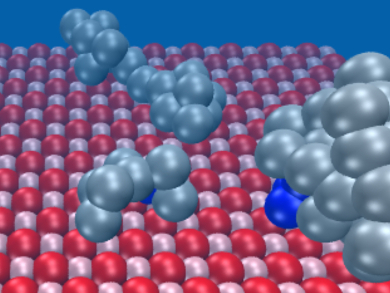Platinum nanoclusters are useful systems for nanoscience and nanocatalysis. However, the spontaneous aggregation of the nanoclusters, also called sintering, can cause Pt atoms to be buried inside larger clusters and become ineffective for catalysis.
Katsuyuki Nobusada, Institute for Molecular Science, Okazaki, and Kyoto University, both Japan, and colleagues have developed a simple and efficient method to inhibit the aggregation of Pt clusters supported on metal oxides. Introducing transition-metal dopants such as Ni into the clusters leads to the formation of Pt-Ni alloys. THis anchors the clusters to the support through the formation of strong chemical bonds between nickel atoms and oxygen atoms of the metal-oxide surface.
The researchers used first-principles molecular-dynamics (FPDM) simulations, enhanced by free-energy sampling techniques, to investigate how the dopant behaves within the clusters to efficiently increase the free-energy barrier and prevent aggregation. This approach harnesses the different intrinsic affinities of Pt and Ni (or comparable metal atoms) towards oxygen to prevent sintering and thus minimize the amount of rare and expensive Pt atoms needed for nanocatalysis.
- Simple but Efficient Method for Inhibiting Sintering and Aggregation of Catalytic Pt Nanoclusters on Metal-Oxide Supports,
Kenichi Koizumi, Katsuyuki Nobusada, Mauro Boero,
Chem. Eur. J. 2016.
DOI: 10.1002/chem.201604188




